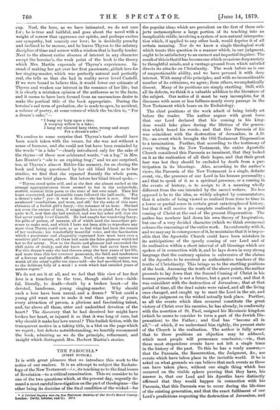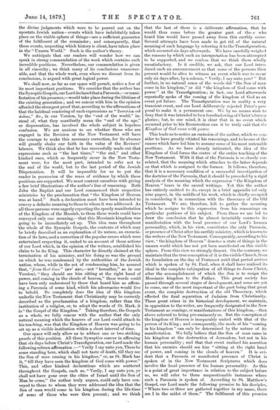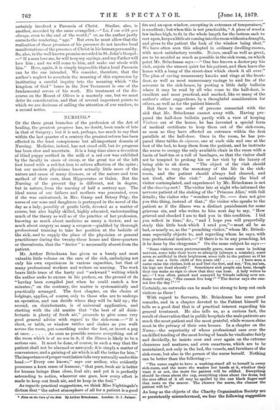THE PAROUSIA..*
[FIRST NOTICE.]
IT 18 with great pleasure that we introduce this work to the -notice of our readers. It is an attempt to subject the Eschato- logy of the New Testament—i.e., its teaching as to the final issues of Revelation—to a critical examination. This we consider to be one of the two questions which, at the present day, urgently de- mand a most careful investigation on the part of theologians—the other being its doctrine of the final condition of the wicked—for * A critical Inquiry into the Bete Testament Doctrine of Our Lord's Secoid Coming. London: Deady, Isbleter, and 04. 1878.
the popular ideas which are prevalent on the first of these sub- jects metamorphose a large portion of its teaching into an inexplicable riddle, involving a system of non-natural interpreta- tion which, if applied to any other book, would deprive it of all certain meaning. Nor do we know a single theological work which treats this question in a manner which, in our judgment, ought to be satisfactory to an earnest and impartial inquirer. The result of this is that it has become one which occasions deep anxiety to thoughtful minds, and a vantage-ground from which unbelief directs its attacks on Christianity. The work before us is one of unquestionable ability, and we have perused it with deep interest. With many of its principles, and with no inconsiderable number of its criticisms, we agree; from others, we emphatically dissent. Many of its positions are simply startling. Still, with all its defects, we think it a valuable addition to the literature of the subject. Our notice of it must be very incomplete, for it discusses with more or less fullness nearly every passage in the New Testament which bears on its Eschatology.
The chief positions of the work admit of being briefly set before the reader. The author argues with great force that our Lord declared that his coming in his king- dom would take place during the lifetime of the genera- tion which heard his words ; and that this Parousia of his was coincident with the destruction of Jerusalem, in A.D. 70,—an event which brought the Old-Testament Dispensation to a termination. Farther, that according to the testimony of every writing in the New Testament, the entire Apostolic Church considered this Parousia as imminent, that they looked on it as the realisation of all their hopes, and that their great fear was lest they should be excluded by death from a par- ticipation in its blessings. Also, according to the author's views, the Parousia of the New Testament is a single, definite event, viz., the presence of our Lord in his human personality ; and that to speak of it as a spiritual presence, or a coming in the events of history, is to assign to it a meaning wholly different from the one intended by the sacred writers. No less opposed is he to the idea, so widely adopted by commentators, that it admits of being viewed as realised from time to time in a lower or partial sense in certain great catastrophes of history, but that it will receive its complete realisation in a personal coming of Christ at the end of the present Dispensation. The author has nowhere laid down his own theory of Inspiration, but one of a very decided character (which we think erroneous) colours the reasonings of the entire work. In conformity with it, and we may say in consequence of it, he maintains that it is impos- sible that the Apostolic Church could have been mistaken in its anticipations of the speedy coming of our Lord and of its realisation within a short interval of all blessings which are spoken of in connection with it, and he lays down in very strong language that the contrary opinion is subversive of the claims of the Apostles to be received as authoritative teachers of the truths of Christianity. This brings us to the startling positions of the book. Assuming the truth of the above points, the author proceeds to lay down that the Second Coming of Christ in his human personality is not a future, but a past event, and that it was coincident with the destruction of Jerusalem; that at that period of time, all the dead saints were raised, and all the living ones chauged, and caught up to meet the Lord in the air, and that the judgment on the wicked actually took place. Further, as all the events which then occurred constitute the great victory of Christ over his enemies, he has already, in conformity with the assertion of St. Paul, resigned his Messianic kingdom (which he seems to consider to form a part of the Jewish Dis- pensation) to the Father ; and God has "become all in all,"—of which, if we understand him rightly, the present state of the Church is the realisation. The author is fully aware that to these positions an objection may be adduced, which most people will pronounce conclusive,—viz., that these most stupendous events have not left a single trace in the history of the past. To this he has a ready answer,— that the Parousia, the Resurrection, the Judgment, &a, are events which have taken place in the invisible world. If he is asked on what grounds we can believe that such events as these can have taken place, without one single thing which has occurred on the visible sphere proving that they have, his answer is, that our Lord and his Apostles have distinctly affirmed that they would happen in connection with his Parousia, 'that this Parousia was to occur during the life-time of the existing generation, and that the exact fulfilment of our Lord's predictions respecting the destruction of Jerusalem, and the divine judgments which were to be poured out on the apostate Jewish nation—events which have indubitably taken place on the visible sphere of things—are a sufficient guarantee of the fulfilment of the remainder ; and consequently, that these events, respecting which history is silent, have taken place in the "Unseen World." Such is the author's theory.
We anticipate that our readers will wonder how we can speak in strong commendation of the work which contains such incredible positions. Nevertheless, our commendation is given in all sincerity ; we think many of its conclusions unanswer- able, and that the whole work, even where we dissent from its conclusions, is argued with great logical power.
We shall now, as far as our space will permit, notice a few of its most important positions. We consider that the author has the Synoptic Gospels, our Lord declared that a Parousia,—or mani- festation of his presence,—would take place during the lifetime of the existing generation ; and we concur with him in the opinion afforded the strongest proof that, according to the affirmations of that the habitual rendering of such expressions as " sirrExiictro citZrog," dm., in our Version, by the "end of the world," in- stead of, what they manifestly mean the "end of the age," or dispensation, has involved the whole subject in hopeless confusion. We are anxious to see whether those who are engaged in the Revision of the New Testament will have the courage to make this necessary correction, for its absence will greatly shake our faith in the value of the Revisers' labours. We think also that he has successfully made out that expressions such as "the last times," "the end," and other kindred ones, which so frequently occur in the New Testa- ment were, for the most part, intended to refer not to the end of the world, but to the last period of the Jewish Dispensation. It will be impossible for us to put the reader in possession of the mass of evidence by which these positions are supported. We must content ourselves with giving a few brief illustrations of the author's line of reasoning. Both John the Baptist and our Lord commenced their respective ministries by the proclamation that "the Kingdom of Heaven was at hand." Such a declaration must have been intended to convey a definite meaning to those to whom it was addressed. As all these persons were eagerly expecting the speedy manifestation of the Kingdom of the Messiah, to them these words could have conveyed only one meaning,—that this Messianic kingdom was going to be immediately set up. This idea runs throughout 'the whole of the Synoptic Gospels, the contents of which may be briefly described as an explanation of its nature, an enuncia- tion of its laws, and a correction of the popular errors which were entertained respecting it, united to an account of those actions of our Lord which, in the opinion of the writers, established his claim to be its King. This character he directly claimed at the termination of his ministry, and his doing so was the ground on which he was condemned by the authorities of the Jewish nation, whom, while in the act of condemning him, he assured that, "from that time" (cilr' eiprt,—not "hereafter," as in our Version), "they should see him sitting at the right hand of power, and coming in the clouds of heaven," these words could have been only understood by those that heard him as affirm- ing a Parousia of some kind, which his adversaries would live to behold. So completely does the idea of this kingdom underlie the New Testament that Christianity may be correctly described as the proclamation of a kingdom, rather than the institution of a religion, or, to adopt the words of St. Mark, it is" the Gospel of the Kingdom." Taking therefore, the Gospels as a whole, we fully concur with the author that the only natural meaning which the hearers of our Lord could attach to his teaching, was that the Kingdom of Heaven was going to be set up as a visible institution within a short interval of time.
Our space will only allow us to adduce one or two striking proofs of this position. All three Synoptics concur in affirming that six days before Christ's Transfiguration, our Lord made the following solemn affirmation :—" Verily I say unto you, There be some standing here, which shall not taste of death, till they see the Son of man coming in his kingdom," or, as St. Mark has it, "till they have seen the kingdom of God come with power." This, and other kindred declarations which are scattered throughout the Gospels, such as, "Verily, I say unto you, ye shall not have gone over the cities of Israel until the Son of Man be come," the author truly argues, could only have con- veyed to those to whom they were addressed the idea that the Son of man would come in his kingdom during the life-time of some of those who were then present ; and we think
that the last of them is a deliberate affirmation, that he would thus come before the greater part of tho- e sho heard him would have passed away from this earthly scene. Several attempts have been made to get rid of the natural meaning of such language by referring it to the Transfiguration, which occurred six days afterwards. We have carefully weighed the reasons by which such an interpretation has been attempted to be supported, and we confess that we think them wholly unsatisfactory. Is it credible, we ask, that our Lord intro- duced such an announcement as that some of the persons then present would be alive to witness an event which was to occur only six days after, by a solemn, "Verily, I say unto you ? " But further, in no natural sense of the words did "the Son of man come in his kingdom," or did "the kingdom of God come with power" at the Transfiguration ; in fact, our Lord afterwards repeatedly spoke of the coming of the kingdom of God as an event yet future. The Transfiguration was in reality a very transient event, and our Lord deliberately rejected Peter's pro- posal to make it a permanent one. We by no means wish to deny that it was intended to be a foreshadowing of Christ's future glories ; but, to our mind, it is clear that in no event which occurred prior to his Resurrection can it be truly said that the Kingdom of God came with power.
This leads us to notice an omission of the author, which we con- sider to have greatly vitiated his reasonings, and to be one of the causes which have led him to assume some of his most untenable positions. As we have already intimated, the idea of the Kingdom of God forms the centre of the entire teaching of the New Testament. With it that of the Parousia is so closely cor- related, that the meaning which attaches to the latter depends on that which is assigned to the former. It follows, therefore, that it is a necessary condition of a successful investigation of the doctrine of the Parousia, that it should be preceded by a rigid analysis of the meaning which the expression "the Kingdom of Heaven" bears in the sacred writings. Yet this the author has entirely omitted to do, except in a brief appendix (of only nine pages), in the middle of his work, which is chiefly occupied in considering it in connection with the theocracy of the Old Testament. We are, therefore, left to gather the meaning which he assigns to this expression from his reasonings on particular portions of his subject. From these we are led to draw the conclusion that he almost invariably connects its manifestation with the local presence of our Lord's human personality, which, in his view, constitutes the only Parousia, or presence of Christ after his earthly ministry, which is known to the writers of the New Testament. Consequently, according to his view, " the kingdom of Heaven" denotes a state of things in the unseen world which has not yet been manifested on this visible sphere. From this view we strongly dissent. On the contrary, we maintain that the true conception of it is the visible Church, from its foundation on the day of Pentecost until that period arrives which is spoken of by St. Paul, when it shall have realised its ideal in the complete subjugation of all things to Jesus Christ, after the accomplishment of which the Son is to resign the Messianic kingdom to the Father. This great society has passed through several stages of development, and some are yet to come, one of the most important of the past being that great event, the complete destruction of the old Theocracy. which effected the final separation of Judaism from Christianity. These great crises in its historical development, we maintain, in opposition to the writer, are frequently designated in the New Testament as comings, or manifestations of this kingdom,—that above referred to being pre-eminently so. But the conception of the kingdom of Heaven is inseparably united with that of the person of its King ; and consequently, the mode of his "coming in his kingdom" can only be determined by the nature of its manifestation. We fully believe that the Son of man came in his kingdom at the destruction of Jerusalem, but not in his human personality ; and that that event realised his assertion that his enemies should see him "sitting at the right hand of power, and coming in the clouds of heaven." It is evi- dent that a Parousia or manifested presence of Christ is spoken of in the New Testament Scriptures which does involve the local presence of his human personality. As this is a point of great importance in relation to the subject before us, we will refer to three unquestionable instances where such a Parousia is spoken of. According to St. Matthew's Gospel, our Lord made the following promise to his disciples, "Where two or three are gathered together in my name, there am I in the midst of them." The fulfilment of this promise
certainly involved a Pasonsia of Christ. Similar, also, is another, recorded by the same evangelist,—" Lo, I am with you always, even to the end of the world ;" or, as the author justly corrects the rendering, "age." But even he must allow that the realisation of these promises of his presence do not involve local manifestations of the presence of Christ in his human personality. So, also, in the well known promise recorded in St. John's Gospel : —" If a man love me, he will keep my sayings, and my Father will love him ; and we will come to him, and make our abode with him." Here, again, it is simply impossible that a local Parousia can be the one intended. We consider, therefore, that the author's neglect to ascertain the meaning of this expression by instituting a careful inquiry into the meaning which "the kingdom of God" bears in the New Testament is one of the fundamental errors of his work. His treatment of the dis- course on the Mount of Olives is a masterly One, but we must defer its consideration, and that of several important points to which we are desirous of calling the attention of our readers, to a second notice.




































 Previous page
Previous page